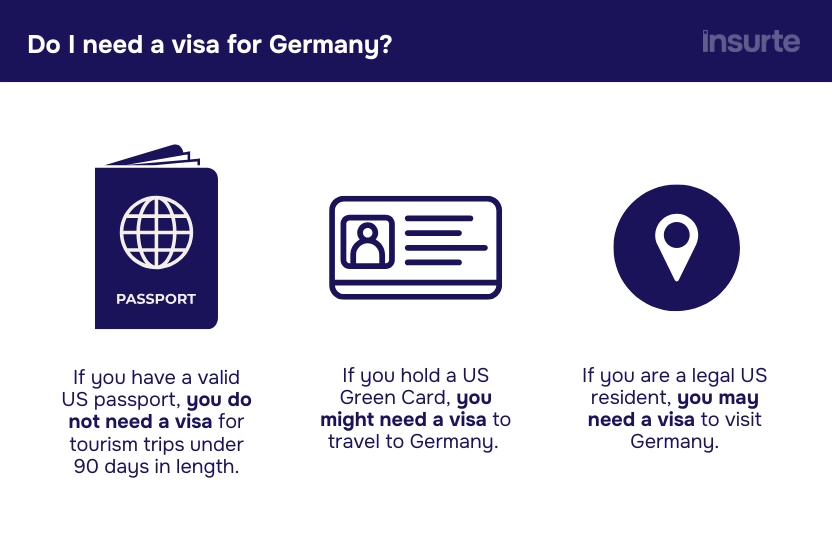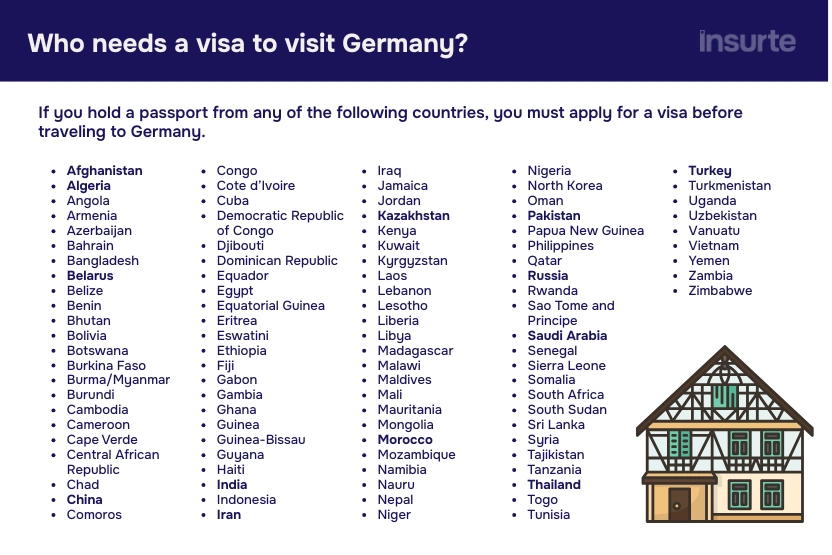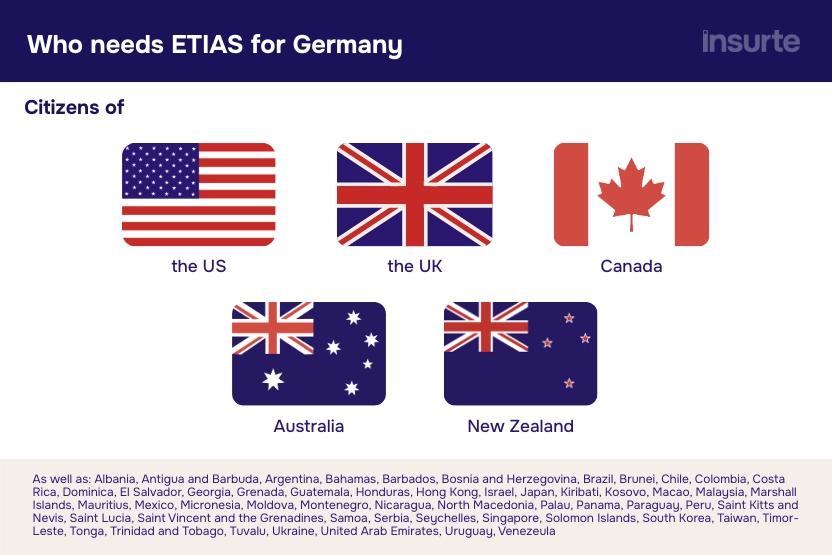
Traveling to Germany from the US: A Guide for 2026
Sarah Pardi - January 26, 2026
Home > Travel Requirements, Policy & Authorization > Traveling to Germany from the US: A Guide for 2026
Share this post
Whether it's your first time or 50th time traveling to Germany from the US, you'll find that the travel requirements, recommendations, and official advice can change.
After all, as the world continues to develop technologically and landscapes evolve, regulations and policies do too.
If you're planning a trip to Germany from the US, you have come to the right place. We will be taking a look at everything from visas and travel insurance to other German requirements like vaccines and driver's licenses.
Whether you're a US citizen, a green card holder, or simply a resident, you'll learn everything you need to know to properly prepare for your trip overseas.

Some travelers need a visa
Not everyone heading to Germany will need a visa, but some will.
Whether you need a German visa or not mostly depends on your citizenship, but it can also depend on why you're traveling to Germany and for how long.
Citizens of many different countries don't need a visa in order to travel to Germany for short trips (such as to explore a new city as a tourist).
If you're a citizen of the US, UK, or Canada, for example, you don't need a visa to visit Germany (so long as you stay fewer than 90 days in a 180-day period).
Regardless, travelers need a valid passport to head abroad.
If you do need a Schengen visa for Germany, make sure you familiarize yourself with all of the required documents. For instance, several documents are required, like hotel bookings and proof of insurance that meets Schengen visa insurance requirements.

Green card holders
If you hold a valid US Green Card, it doesn't automatically give you the right to travel to Germany visa-free. While US citizens have this privilege, whether or not you do depends on your citizenship (which country issued you your passport).
In the event of a denied visa, you can learn more about the appeal process here: German visa appeal process.
US residents (who are not citizens)
The same is true for legal US residents. If you are a legal US resident, whether or not you can travel to Germany without a visa depends on the country that issued your passport.
For example, if you hold a Canadian or Mexican passport, you can travel to Germany without a visa.
If you hold an Indian or Chinese passport, you will need a visa to travel to Germany. This is the case for several other nationalities too.
That said, if you do need a visa, you can apply for it in the States (if that is where your legal residency is).

A new requirement starts in 2026
For US citizens (among others), a new requirement is set to start in 2026 that will necessitate an additional step for visa-free visitors. This includes US and UK citizens.
In 2026, Germany will require all travelers without a visa to apply for something called an ETIAS.
ETIAS, which stands for European Travel Information and Authorisation System, is similar to the US's ESTA and the UK's ETA.
Instead of simply buying a ticket and heading to Germany, citizens from several countries will need to get an approved ETIAS before boarding their flights to Germany.
While this may sound intimidating, it is a simple, 20-minute process that costs 20 euros per person and takes place entirely online.
Germany travel insurance requirements
Like other countries in Europe, Germany does have travel insurance requirements for specific travelers.
In any case, getting travel insurance before going to Germany is recommended by both US and UK governments.
Who it is mandatory for
If you're applying for a Schengen visa to travel to Germany, travel insurance is mandatory. In most cases, travel insurance is also required for long-stay visas for Germany too. That being said, sometimes Health Insurance is required for long stays.
Germany is a member of the Schengen area. For all intents and purposes, this means that most travelers who need a short-stay visa for Germany have to get a Schengen visa. There are different types, but the typical short-stay Schengen visa allows travelers to visit Germany for durations up to 90 days.
If you need a visa to travel to Germany, you will be asked to show proof of compliant travel insurance when you submit your visa application.
Schengen Compliant Insurance
Get visa-compliant insurance for Germany here.
Germany has passport requirements
Also, because Germany is a member of the Schengen area, there are passport requirements that you will need to meet (whether you need a visa or not).
To travel to Germany, your passport needs to meet the following conditions:
- It must remain valid at least 3 months beyond your intended stay, though the US Government recommends 6 months.
- It must have at least 2 blank pages remaining for stamps.
- It needs to have been issued in the past 10 years.
Vaccine requirements for Germany
There are no vaccine requirements to travel to Germany. This includes COVID-19.
Even so, the US government advises all US travelers to make sure they're up to date on all routine vaccinations before going to Germany.
Always check the official CDC website for the most up-to-date information.
You can drive with a US license
Valid US driver's licenses are recognized in Germany for up to 6 months. This means that you can drive in Germany so long as you have a US driver's license.
One other good thing to know is that you'll need a travel adapter when visiting Germany. You can learn everything you need to know in our Germany Plug Types Guide.
Related posts
Upcoming travels ? Get Insured !
Find the right insurance for your trip by using our powerful comparison tool!
Sarah Pardi - February 26, 2026
Sarah Pardi - February 19, 2026
Sarah Pardi - February 13, 2026
Sarah Pardi - February 12, 2026





